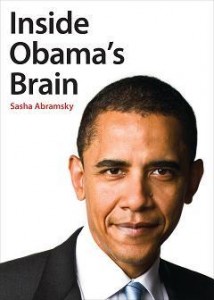 Sasha Abramsky is one of the most original and politically insightful investigative journalists writing in the US today. He is best known for books such as Hard Times Blues, a penetrating critique of the US prison system, and Breadline USA, which reveals the hidden scandal of everyday hunger and poverty faced by American families. He is also a Senior Fellow at the New York City-based Demos think tank. His new book, Inside Obama’s Brain, attempts to delve inside the mind of the 44th President. I spoke to him about the book, and the central role that empathy plays in Obama’s political vision.
Sasha Abramsky is one of the most original and politically insightful investigative journalists writing in the US today. He is best known for books such as Hard Times Blues, a penetrating critique of the US prison system, and Breadline USA, which reveals the hidden scandal of everyday hunger and poverty faced by American families. He is also a Senior Fellow at the New York City-based Demos think tank. His new book, Inside Obama’s Brain, attempts to delve inside the mind of the 44th President. I spoke to him about the book, and the central role that empathy plays in Obama’s political vision.
Roman Krznaric: What is the fundamental argument of your latest book, Inside Obama’s Brain? And what can it tell us about him that can’t be found in a standard biography or in any of Obama’s own writings?
Sasha Abramsky: A standard biography is interested in the chronology of Obama’s life. My book, by contrast, is interested in exploring the contours of Obama’s mind: how he thinks; how he approaches problems; how he interacts with people both in public and private settings; how he understands the ebb and flow of history; what one can learn about Obama through exploring his hobbies – his competitive interest in sports, in particular. It’s far more of a classic profile-writ-large than it is a conventional biography, and I build it up, layer by layer, through talking to people who have interacted with Obama at all these different moments, or strata of his life. It is, in that sense, the ultimate Obama write-around (that being the term used by Gay Talese, who forty-three years ago, wrote the most famous profile of Frank Sinatra: he called it a “write-around” because he built up Sinatra’s persona and presence, through a multitude of different people’s impressions of Sinatra in a variety of situations). I hope, by the end of my book, readers will have a strong sense that they really do understand what makes Barack Obama tick.
Roman Krznaric: Obama has repeatedly said that empathy is his most important political value. He has stated, for instance: ‘We seem to be suffering from an empathy deficit – our ability to put ourselves in someone else’s shoes, to see the world through those who are different from us – the child who’s hungry, the laid-off steel worker, the immigrant woman cleaning your dorm room.’ Just how important do you think empathy is to his approach to politics? And what makes him care about it?
Sasha Abramsky: To me, Obama’s language of empathy is very powerful. Certainly, as he has risen up the political ladder, it is his ability to make people feel included or important that has, over the years, served him well. Without suggesting it’s fake in any way, because I don’t believe it is, I do think that, pragmatically, the art of empathy makes him a very strong candidate.
It comes, I believe, from the fact that personally he has a rather unique background; he’s a racial and cultural mix, and his mother moved him to Indonesia for several years when he was a small kid. He had to imbibe more of the world’s perspectives and experiences than do most young children. And I think those lessons stuck with him. His sister Maya teaches her students to play a ‘doubting game’ in which they learn to doubt their own preconceived ideas and try to think like other people. They put themselves in other peoples’ shoes. I’m sure that notion was inculcated in Barack and Maya by their mother when they were young children. It’s a humanistic equivalent to the game of scientific/philosophical doubt that Descartes played as he was stumbling toward his theory Cogito Ergo Sum.
When you hear Obama speak, or read his writings, this notion of being able to walk in other peoples’ shoes, being able to absorb other people’s voices, is central to his political vision. I think a lot of conservatives mocked this during the election, and a lot of progressives today sneer at it and say he’s a faux populist but doesn’t really mean what he says. Personally I don’t think that’s fair. It seems to me that, while he clearly isn’t as pure an idealist as many of his supporters hoped he would be, that he very much is, at his core, an empathetic politician.
The question of the moment for me is whether it’s possible to not just campaign empathetically but also to govern empathetically? In other words, do the needs of state, the messiness (the compromises, the input of secret information in decision-making etc) of governance in some ways inevitably dilute even Obama’s empathetic strengths? My sense is he has retained the ability to take advice from a tremendous number of different people and that he absorbs many different perspectives; but, at the end of the day, D.C. isn’t a particularly empathetic environment – and many of his policy goals will end up somewhat frayed simply by the rough back-and-forth of Congressional debate. I think we’ve seen that, to a point, with the healthcare reform agenda.
Roman Krznaric: Obama’s nomination earlier this year of Sonia Sotomayor to the Supreme Court sparked the first explicit political controversy about empathy that I’ve ever come across. Obama claimed that she would make an excellent judge because of her empathetic qualities, coming from an underprivileged Hispanic background, which triggered a backlash from Republicans and conservative thinkers, who argued that the law was a matter of cool rationality and following the rules, not touchy-feely empathy. Sotomayor seemed quickly to agree with them, keeping quiet about empathy and emphasising her legal impartiality. How significant was this episode, and what does it tell us about American politics?
Sasha Abramsky: The Sotomayor nomination was, on one level, an attempt to prioritize empathy within the higher echelons of the court system. On the other hand, one can over-emphasize that: in addition to her empathetic qualities, she’s a very skilled, knowledgeable judge, an expert in jurisprudence who is very qualified for a place on the Supreme Court.
My sense was the Republicans were on something of a fishing expedition when they went after Sotomayor for some of her statements about having a sense of empathy because of who she was and where she came from. After all, everyone, by definition, has their own peculiar life story and that life story will provide them with certain empathetic qualities vis-à-vis particular groups. The Republicans knew that; they also knew they could whip up some fear around race and gender by misconstruing her comments. It was, I think, something of a storm in a teacup, and I don’t think it’s carried over very far into the popular consciousness.
The more important issue here is the sorts of judicial values that will dominate the Supreme Court in the years to come. During the Bush years, the Supreme Court began tilting fairly far to the right. Sotomayor’s nomination began the process of tilting it back if not to progressivism then at least toward the center.
Clip from the press conference in which Obama said he considered empathy to be a vital quality for his new appointment to the Supreme Court.
Roman Krznaric: Obama has given priority to the domestic issue of health care reform over the international issue of climate change, pushing forward with legislation on the former while the world waits for serious US action on the latter. Notwithstanding his visit to Copenhagen this month, his empathy for those who are left out of the US health system appears – at least in practical terms – greater than his empathy for the present and future victims of climate change. Is this a fair depiction of his position? Or is this prioritizing simply a matter of Washington realpolitik?
Sasha Abramsky: On healthcare, I’d disagree somewhat with your premise. Yes, he’s focused on getting some version of healthcare reform passed by Congress – and in the short term that might mean other issues slide slightly on the administration’s priority list; on the other hand, without prioritizing, nothing would get done. That’s the tension between holistic, universal, rhetoric, and the D.C. world of realpolitik. In a sense my bigger concern is not that he’s spending too much time on healthcare but that he waited a few months too long before realizing just how much personal energy he would have to expend convincing a select handful of centrist Democratic representatives and senators to support meaningful reforms.
I think, when it comes to climate change, he’s actually moving the American political system about as fast as it can be moved. That still might not be fast enough, but it’s a whole lot faster than it would have moved on the issue under Bush or even under McCain, one of the few senior Republicans to take the issue seriously.
Roman Krznaric: You write in your book about the thematic importance of empathy in Obama’s famous ‘A More Perfect Union‘ speech, given in Philadelphia in March 2008, which tackled race issues. You discuss how his language convinced impoverished African Americans that he could step into their shoes, while also expressing his understanding of the frustrations of whites who felt that affirmative stood in the way of their own dreams. Yet in seemingly extending his empathy to everybody, how then does Obama make policy decisions that involve conflicts of interest between different groups (for instance on the issue of affirmative action or abortion)? You can’t empathise with everybody all of the time.
 Sasha Abramsky: It’s certainly possible that there is a logical limit to any politics of empathy – that, at the end of the day, one can only compromise up to a point without diluting one’s core values to a point where they cease to hold sway; it’s also possible that in a toxicly partisan environment, in which scoring political points often outweighs long-term political calculi, Obama will ultimately lack partners with whom to sit down at the table. That’s when the empathist has to be joined by the hard-hitting politician, the person prepared to get partisan when he needs to get the job done.
Sasha Abramsky: It’s certainly possible that there is a logical limit to any politics of empathy – that, at the end of the day, one can only compromise up to a point without diluting one’s core values to a point where they cease to hold sway; it’s also possible that in a toxicly partisan environment, in which scoring political points often outweighs long-term political calculi, Obama will ultimately lack partners with whom to sit down at the table. That’s when the empathist has to be joined by the hard-hitting politician, the person prepared to get partisan when he needs to get the job done.
For further details about Sasha Abramsky’s books and journalism, visit his website.